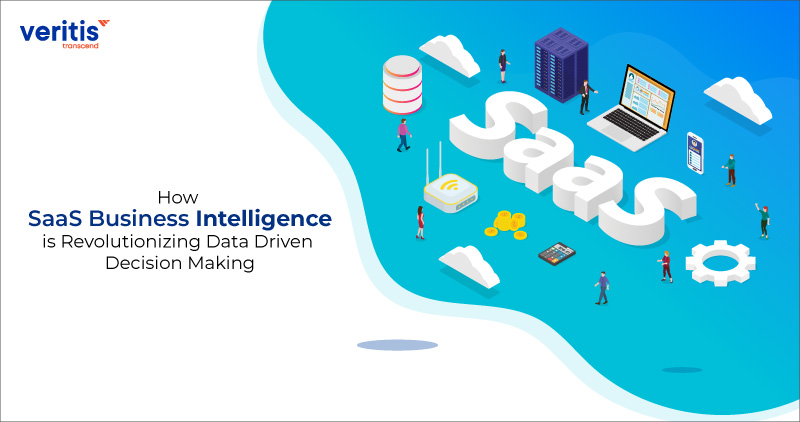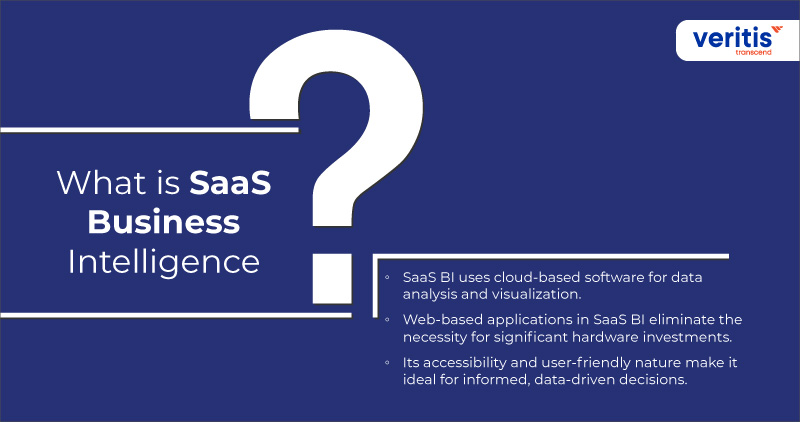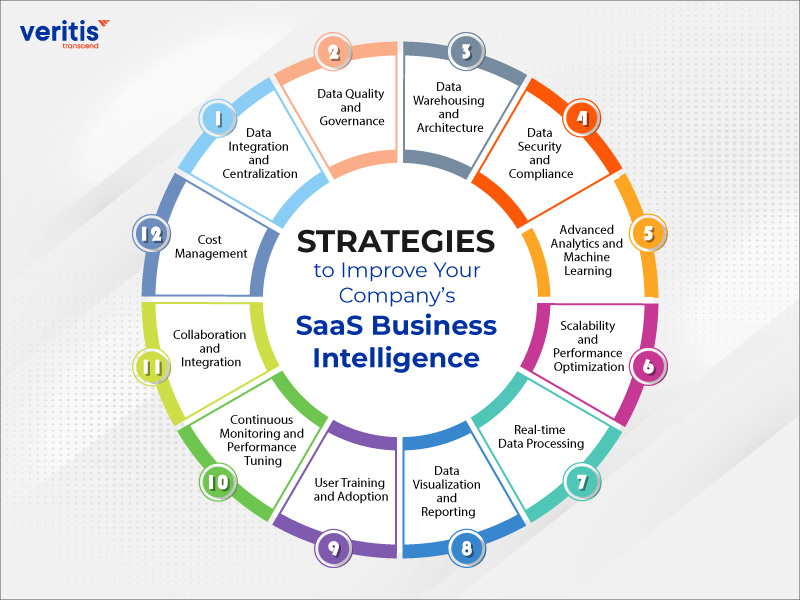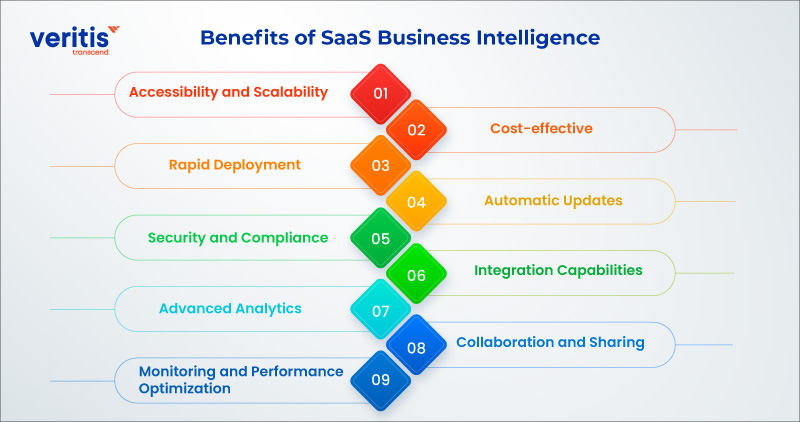
In the business world, the importance of data for making informed decisions cannot be overstated. Organizations are continuously searching for tools to improve the effectiveness of their data management procedures. This is where Software as a Service (SaaS) Business Intelligence (BI) becomes pivotal. SaaS BI is a cloud-based solution that empowers companies to efficiently handle, analyze, and visualize their data in real-time.
By leveraging SaaS BI, businesses can obtain valuable insights into their operations, pinpoint areas for enhancement, and make decisions based on real-time data, ultimately leading to improved business outcomes.
According to forecasts made in late 2023 by Vena Solutions, the global SaaS Business Intelligence (BI) market is anticipated to achieve a substantial size of approximately USD 333.03 billion by the conclusion of 2024. This projection reflects a notable 28% year-over-year growth from the estimated value of USD 260.57 billion in 2023.
The CAGR for the SaaS BI market is expected to maintain robustness, hovering around 9% over the next few years (Source: Vena Solutions). These statistics underscore the continuous expansion and significance of SaaS BI in the evolving business intelligence field.
SaaS BI is a delivery model that provides access to business intelligence tools and services via a software-as-a-service framework. This approach enables organizations to efficiently utilize advanced analytics, data visualization, and SaaS reporting capabilities over the Internet, reducing the need for on-site physical infrastructure.
Significantly, SaaS BI platforms often integrate essential features such as data integration, data warehousing, ad hoc querying, and dashboards. Effectively utilizing these capabilities empowers businesses to extract actionable insights from their datasets, facilitating informed decision-making.
What is SaaS Business Intelligence?

SaaS Business Intelligence involves utilizing cloud-based software solutions for data analysis, report generation, and creating visualizations to gain actionable insights. In contrast to traditional on-premise BI systems, SaaS BI enables businesses to access robust analytics capabilities through web-based applications, eliminating the need for significant hardware investments or intricate software installations. The top SaaS BI tools are designed to efficiently handle large volumes of data in the cloud business intelligence tools, ensuring optimal performance even as data volumes increase exponentially.
Ideally, these tools seamlessly connect and query data directly within the cloud data platform, ensuring that insights are consistently updated with the underlying data. The accessibility, flexibility, and user-friendly nature of SaaS BI make it an appealing choice for organizations of all sizes, empowering them to make informed, data-driven decisions without the complexities of managing infrastructure. While SaaS BI benefits all organizations, it becomes precious for those who have already invested in a cloud data platform, enhancing their overall return.
The Significance of Software as a Service Business Intelligence
When SaaS enterprises effectively harness business intelligence, it creates opportunities for data-driven forecasting, heightened customer experiences, optimized operations, and improved product offerings.
Predictive analytics in business functionalities prove especially advantageous for SaaS firms, leveraging historical data to proactively address potential issues and enhance future planning.
SaaS business intelligence facilitates the simplification of intricate data, converting it into actionable insights for more informed decision-making. Essentially, it empowers SaaS companies to proactively address contemporary challenges by thoroughly analyzing past data and maintaining a strategic advantage.
Useful link: Guide to Digital Transformation Technologies and Their Business Impact
Strategies to Improve Your Company’s SaaS Business Intelligence

Improving your company’s SaaS (Software as a Service) business intelligence (BI) is crucial for making data-driven decisions, optimizing operations, and driving growth. Here are some technical strategies to enhance your SaaS BI:
1) Data Integration and Centralization
- Integrate data from various sources: Pull data from multiple sources like CRM systems, marketing automation tools, databases, and third-party APIs into a centralized data warehouse or data lake.
- ETL (Extract, Transform, Load) processes: Implement robust ETL processes to clean, transform, and load data efficiently, ensuring data consistency and accuracy.
2) Data Quality and Governance
- Data cleansing: Regularly clean and validate data to remove duplicates, errors, and inconsistencies.
- Data governance framework: Establish data governance policies, roles, and responsibilities to maintain data quality and security.
3) Data Warehousing and Architecture
- Modern data warehousing: Utilize cloud-based data warehouses (e.g., Amazon Redshift, Snowflake, or Google BigQuery) for scalability, performance, and cost-effectiveness.
- Data modeling: Develop effective data models and schema designs to support complex analytics and SaaS reporting.
4) Data Security and Compliance
- Data encryption: Encrypt data in transit and elsewhere to ensure data security.
- Compliance adherence: Ensure your SaaS BI system complies with industry-specific regulations (e.g., GDPR, HIPAA).
5) Advanced Analytics and Machine Learning
- Predictive analytics in business: Implement machine learning models to predict trends, customer behavior, and churn.
- Natural language processing (NLP): Incorporate NLP to extract insights from unstructured text data.
6) Scalability and Performance Optimization
- Auto-scaling: Use cloud-based services that offer auto-scaling to handle fluctuations in data volume and user load.
- Query optimization: Optimize SQL queries and indexing for faster data retrieval.
Useful link: All You Need to Know about Artificial Intelligence as a Service (AIaaS)
7) Real-time Data Processing
- Stream processing: Implement real-time data processing using technologies like Apache Kafka or AWS Kinesis to provide up-to-the-minute insights.
- Real-time dashboards: Develop dashboards that display live data for immediate decision-making.
8) Data Visualization and Reporting
- Interactive dashboards: Utilize BI tools like Tableau, Power BI, or Looker to create interactive dashboards for users.
- Customizable reporting: Offer users the ability to create custom reports and visualizations.
9) User Training and Adoption
- Training programs: Offer training sessions and provide resources to empower users in maximizing their comprehension and utilization of the BI platform.
- User feedback: Collect feedback from users to improve the BI system’s usability and functionality continuously.
10) Continuous Monitoring and Performance Tuning
- Monitoring tools: Implement solutions to track system performance, data quality, and security.
- Regular maintenance: Schedule regular maintenance and updates to optimize and secure the SaaS BI system.
11) Collaboration and Integration
- Integration with other SaaS tools: Enable seamless integration with other software applications to enhance data flow and collaboration.
- API access: Provide APIs for developers to extend and customize BI functionalities.
12) Cost Management
- Cost optimization: Continuously monitor and optimize the usage of cloud business intelligence tools to control costs.
- Usage tracking: Implement usage tracking and billing mechanisms to allocate costs accurately.
By implementing these technical strategies, your company can enhance its SaaS intelligence capabilities, ultimately leading to better decision-making and business analytics software growth.
Useful link: How AI Adoption Will Transform Your Business
Benefits of SaaS Business Intelligence

SaaS Business Intelligence (BI) offers several technical benefits that can significantly enhance an organization’s data analytics and decision-making processes. Here are some of the key technical advantages of SaaS BI:
1) Accessibility and Scalability
- Cloud-based Infrastructure: SaaS BI is hosted on cloud platforms, making it quickly accessible from anywhere in the world with an internet connection. This allows for remote access and collaboration, fostering a more flexible work environment.
- Scalability: SaaS BI solutions can quickly scale up or down based on changing data volumes and user requirements. Cloud providers offer resources on-demand, ensuring that your BI system can handle increasing data loads without significant infrastructure investments.
2) Cost-effective
- Lower Upfront Costs: Traditional on-premises BI solutions often require substantial upfront hardware and software investments. SaaS BI eliminates these costs, operating on a subscription-based model with predictable monthly or annual fees.
- Reduced Maintenance: SaaS BI providers handle infrastructure maintenance, updates, and security, reducing the burden on IT teams. This frees up resources for more strategic tasks.
3) Rapid Deployment
Quick Implementation: SaaS BI solutions can be deployed faster than traditional BI systems. You can start analyzing data and generating insights within days or weeks instead of the months it may take for an on-premises implementation.
4) Automatic Updates
Continuous Improvements: SaaS BI vendors regularly release platform updates and enhancements. Users benefit from the latest features, security patches, and performance improvements without requiring manual upgrades.
5) Security and Compliance
- Vendor Expertise: SaaS BI providers typically have dedicated security teams and compliance experts who ensure that data is protected and regulatory needs are met.
- Data Encryption: Most SaaS BI solutions employ rest and transit encryption to safeguard sensitive data.
- Authentication and Access Control: Robust authentication mechanisms and access controls help ensure authorized users can access and interact with data.
Useful link: Top Applications of Quantum Computing
6) Integration Capabilities
- APIs and Connectors: SaaS BI tools often offer various APIs and pre-built connectors to various data sources, simplifying data integration efforts.
- Third-party Integrations: They can easily integrate with other SaaS applications and services, allowing for seamless data flow between different parts of an organization.
7) Advanced Analytics
- Machine Learning and Predictive Analytics: Many SaaS BI platforms offer built-in machine learning and predictive analytics in business capabilities, enabling users to discover hidden patterns and make data-driven predictions.
- Natural Language Processing (NLP): Some SaaS BI tools incorporate NLP to allow users to query data using natural language, making data exploration more accessible to non-technical users.
8) Collaboration and Sharing
- Real-time Collaboration: SaaS BI platforms often support real-time collaboration, enabling teams to simultaneously work on data analysis and SaaS reporting.
- Sharing and Distribution: Users can easily share dashboards, reports, and insights with colleagues or external stakeholders, enhancing communication and decision-making.
9) Monitoring and Performance Optimization
Built-in Monitoring: SaaS BI solutions often include monitoring and performance optimization features, allowing users to track system performance, query execution times, and data quality in real-time.
SaaS business analytics software provides a technologically advanced and cost-effective approach to data analytics and SaaS reporting. It allows companies to make data-driven decisions efficiently, leverage advanced analytics capabilities, and stay agile in a rapidly changing business analytics software domain. The technical benefits of SaaS BI make it a compelling choice for companies seeking to maximize the value of their data.
Conclusion
The Software as a Service (SaaS) Business Intelligence surge reshapes data-driven decision-making globally. The projected growth underscores its pivotal role, providing organizations with cloud-based tools for efficient data management and analysis.
SaaS BI’s technical strategies offer a roadmap for enhanced data capabilities, while its benefits in accessibility, scalability, cost-effectiveness, and security contribute to improved business outcomes. Veritis, Stevie Awards, and Globee Business Award winner stands ready to guide organizations through this transformative journey, offering unparalleled expertise in maximizing the value of their data resources.
Got Questions? Schedule A Call
Also Read:
- What’s SaaS, and What are the SaaS Tools You Should Use?
- What is Cloud Computing Security?
- How to Enhance Security in the Multi-Cloud Era
- What is Operational Security (OPSEC) and How Does it Protect Critical Data?
- Security Breaches Rising Exponentially; Weak Authentications Exploited
- What is Security as a Service (SECaaS)?